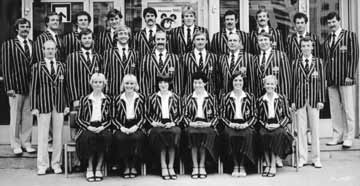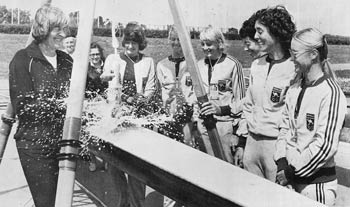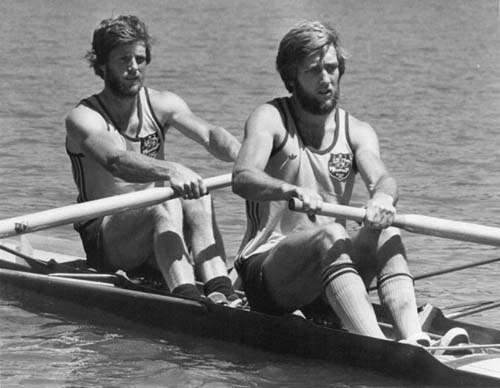Olympic Games—Moscow 1980
The Games were unfortunately interfered with by politicians with many western nations boycotting the celebrations due to the Soviet invasion of Afghanistan in late 1979. The AOC allowed each of the national sports federations to decide if their respective sport would compete.

1980 Olympic Rowing Team
Fortunately the ARC withstood massive Federal Government pressure to withdraw. The efforts included lobbying both AOC members and politicians. This involved public relations work and lobbying by the administrators of the sport and the team. The advocacy skills of barrister and men's eight coach Chris Dane were used to the full. Key people were taken to training camps to meet the team.
The standing of rowing did not suffer by the boycott as the predominant rowing countries of Eastern Europe were all represented. The strength of people such as John Coates and John Boultbee were key in this battle and many commentators have attributed their experience at this time to their great work in sport that followed.
The team left Australia before the decision was made and were in flight. The pilot received the decision mid flight and announced it with the words, "How good is your Russian?" The plane erupted with cheers and tears of joy from all but Andrew Peacock, a Federal Cabinet Minister travelling on the same flight. He had a contrary view regarding the team competing at the Games and found himself not welcomed. He retreated to the anonymity of first class and his Presidency of Monash University Rowing Club lapsed.
This was the first time that a doctor oriented to rowing was part of the team. There had been a series of back problems in 1979 and so this appears to have been the impetus for this innovation. Bob Tinning, a rowing Olympian and orthopaedic surgeon, was well suited to meet these requirements. However, he spent most of his time dealing with other medical issues. Since then, general sports medicine doctors have been appointed to travelling rowing teams.
Selection
The influence and ideas of the newly appointed National Coaching Director, Reinhold Batschi, were immediately evident with this team. Prior to nomination to the trial squad, the selectors required for the first time that each person seeking selection in an Australian team to compete in three trial regattas and the National Championships in both pairs and fours – or alternatively single and double sculls – to satisfy selection requirements.
This was the most extensive use of objective criteria for selection to that time. It was a huge step for the ARC administration led by President Bob Aitken and Secretary John Coates who had to convince the constituents of the sport to support matters such as full time training camps.
The education of the sport on the requirements of being successful in international competition took some time. It was one of the many challenging tasks undertaken by John Coates when he became President of the ARC and later President of the Australian Olympic Committee.
In preparation for the Olympic Games full time training camps were undertaken by all members of the team, once selected, at Penrith (NSW), Murray Bridge (SA) and Bundaberg (QLD); together with competition in the lead up regattas in Europe. These regattas included ones in East Berlin (as it then was), Amsterdam NED and Lucerne SUI.
Competing in the East German Championships held on the 1936 Olympic course at Grunau, the men's eight was beaten into second place by the ultimate gold medallists at the Games by just 0.6 seconds. This was as close as any crew from any nation got to the gold medallists. When it is remembered that in winning the repechage the ultimate silver medallists were defeated then the final result of fifth placing could only be seen as disappointing.
Following the introduction of women's rowing to the Olympic programme in Montreal in 1976, the selectors were satisfied that the standard of women's rowing in Australia was sufficient to justify the selection of a coxed four for the Olympic team.
The selectors' faith was well placed in that the four not only performed as well as any other Australian crew at the Olympic regatta but had the additional distinction of being the fastest women's four of the two competing western nations. This is a distinction which seems unusual now but was appropriate at the time. The Australian crew was more than 10 kg per person lighter that their Eastern bloc counterparts.
The crew had also beaten all other boycotting nations at a regatta just prior to the Olympic Regatta. The crew was clearly the best western nation at that time. The selection of the members of this crew was straight forward as it comprised the two fastest pairs and the fastest four in domestic racing. Their coach was David Palfreyman who was very experienced.

Dawn Fraser names the four
Racing—Women
Women's Single Scull
E1: 1st ROM, 2nd GDR, 3rd URS, 4th NED
E2: 1st GBR, 2nd HUN, 3rd DEN, 4th IRL
E3: 1st BUL, 2nd POL, 3rd MEX
R: 1st URS, 2nd IRL, 3rd MEX, 4th DEN, 5th NED
SF1: 1st ROM, 2nd GBR, 3rd POL, 4th IRL
SF2: 1st GDR, 2nd URS, 3rd BUL, 4th HUN
Final B: 7th IRL, 8th DEN
Final: 1st ROM 3:40.69 (Sanda Toma), 2nd URS 3:41.65 (Antonina Makhina),
3rd GDR 3:43.54 (Martina Schroter), 4th BUL 3:47.22, 5th GBR 3:49.71,
6th POL 3:51.45
Women's Double Scull
E1: 1st URS, 2nd ROM, 3rd GDR, 4th BUL
E2: 1st POL, 2nd GBR, 3rd HUN
R: 1st GDR, 2nd BUL, 3rd ROM, 4th HUN, 5th GBR
Final: 1st URS 3:16.27 (Yelena Khloptseve, Larissa Popova), 2nd GDR 3:17.63
(Cornelia Linse, Heidi Westphal), 3rd ROM 3:18.91 (Olga Homeghi, Valerie
Racila-Rosca), 4th BUL 3:23.14, 5th POL 3:27.25, 6th HUN 3:35.70
Women's Coxed Quad Scull
E1: 1st ROM, 2nd NED, 3rd POL, 4th HUN
E2: 1st BUL, 2nd URS, 3rd GDR
R: 1st GDR, 2nd URS, 3rd NED, 4th POL, 5th HUN
Final: 1st GDR 3:15.32 (Sybille Reinhardt, Jutta Ploch, Jutta Lau, Roswietha
Zobelt, Liane Buhr), 2nd URS 3:15.73 (Antonina Pustovit, Yelena Matievskaya,
Olga Ores Nakova, Nadezhda Lyubimova, Nina Cheremisina), 3rd BUL 3:16.10
(Mariana Serbezova, Roumelianao Boneve, Dolores Nakova, Ani Bakova, Stanka
Georgieva), 4th ROM 3: 16.82, 5th POL 3:20.95, 6th NED 3:22.64.
Women's Coxless Pair
E1: 1st URS, 2nd GDR, 3rd BUL
E2: 1st POL, 2nd ROM, 3rd HUN
R: 1st GDR, 2nd ROM, 3rd BUL 4th HUN
Final: 1st GDR 3:30.49 (Ute Steindorf, Cornelia Klier), 2nd POL 3:30.95
(Malgorzata Dluzewska, Czeslawa Koscianska), 3rd BUL 3:32.39 (Siika Barboulova,
Stoyanka Kourbatova), 4th ROM 3:35.14, 5th URS 4:12.53
The organising committee ran 2 heats of three despite only six crews. They insisted on eliminating crews through the semi final thus having a final of only five crews. This is a decision which would not be made today.
Women's Coxed Four
E1: 1st BUL, 2nd ROM, 3rd AUS
E2: 1st GDR, 2nd URS, 3rd GBR
R: 1st URS, 2nd ROM, 3rd AUS, 4th GBR
Final: 1st GDR 3:19.27 (Ramona Kapheim, Silvia Frohlich, Angelika Noack,
Romy Saalfeld, Kirsten Wenzel), 2nd BUL 3:20.75 (Ginka Gyurova, Mariika
Modeva, Rita Todorova, Iskra Velinova, Nadezhda Filipova), 3rd URS 3:20.92
(Mariya Fadeyeva, Galina Sovetnikova, Marina Studneva, Svetlana Semyonova,
Nina Cheremisina), 4th ROM 3:22.08, 5th AUS 3:26.37.
Again the organising committee reduced the final to five crews to enable elimination heats.
Women's Eight
E1: 1st URS, 2nd GBR, 3rd POL
E2: 1st GDR, 2nd ROM, 3rd BUL
R: 1st ROM, 2nd BUL, 3rd GBR, 4th POL
Final: 1st GDR 3:03.32 (Martina Boesler, Kersten Neisser, Christiane Kopke,
Birgit Schultz, Gabriele Kuhn, Ilona Richter, Marita Sandig, Karin Metze,
Marina Wilke), 2nd URS 3:04.29 (Olga Pivovarrova, Nina Umanets, Nadezhda
Prishchepa, Valentina Tereshina, Nina Preobrazhenskaya, Mariya Pazyun,
Noina Friolova), 3rd ROM 3:05.63 (Angelica Aposteanu, Marlena Zagoni,
Rodica Frintu, Florica Bucur, Rodica Puscatu, Ana Iluta, Maria Constantinescu,
Elena Dobritoiu), 4th BUL 3:10.03, 5th GBR 3:13.85
Again the organising committee reduced the final to five crews to enable elimination heats.
Australian Team
Men's Eight – Fifth
- Bow: Bill Dankbaar (SA)
- 2: Stephen Handley (NSW)
- 3: Islay Lee (NSW)
- 4: Andrew Withers (VIC)
- 5: Tim Willoughby (SA)
- 6: James Lowe (VIC)
- 7: Tim Young (VIC)
- Str: Brian Richardson (VIC)
- Cox: David England
- Coach: Chris Dane (VIC)
- Reserves: Henry Duncan (SA) & Bruce Keynes (SA)
Men's Coxless Pair – Tenth
- Bow: John Bolt (SA)
- Str: Robert Lang (SA)
Women's Coxed Four – Fifth
- Bow: Anne Chirnside (VIC)
- 2: Verna Westwood (VIC)
- 3: Pam Westendorf(VIC)
- Str: Sally Harding(VIC)
- Cox: Susie Palfreyman (VIC)
- Coach David Palfreyman (VIC)
- Reserve: Pauline Kahl (NSW)
Head Coach: Reinhold Batschi (AIS)
Manager: John F Boultbee (NSW)
Doctor: Dr Bob Tinning (NSW)
Selectors: Jim Howden (VIC Chairman), Roger Moore (SA),
Bruce Evans (NSW)
Umpire on the Jury: Reg McKay (VIC)
Racing—Men
The East Germans dominated the men's events with only one men's championship escaping their grasp – the men's single scull.
Men's Single Scull
E1: 1st GBR, 2nd GRE, 3rd BRA, 4th FRA, 5th CUB
E2: 1st FIN, 2nd GDR, 3rd TCH, 4th SUI, 5th BUL
E3: 1st URS, 2nd SWE, 3rd AUT, 4th HUN
R: 1st SUI, 2nd HUN, 3rd BUL, 4th CUB
SF1: 1st GDR, 2nd URS, 3rd GBR, 4th HUN, 5th AUT, 6th BRA
SF2: 1st FIN, 2nd TCH, 3rd SWE, 4th GRE, 5th SUI, 6th BUL
Final B: 7th SUI, 8th GRE, 9th HUN, 10th BUL, 11th AUT, 12th BRA
Final: 1st FIN 7:09.61 (Pertti Karppinen), 2nd URS 7:11.66 (Vassily Yakusha),
3rd GDR 7:14.88 (Peter Kersten), 4th TCH 7:17.57, 5th SWE 7:19.38, 6th
GBR 7:20.28
The great Pertti Karppinen from Finland made it two Olympic Championships in a row. However Peter-Michael Kolbe from West Germany was sorely missed.
Men's Double Scull
E1: 1st GDR, 2nd YUG, 3rd URS, 4th FRA, 5th BUL
E2: 1st GBR, 2nd POL, 3rd ESP, 4th TCH
R1: 1st YUG, 2nd TCH, 3rd ESP, 4th BUL
R2: 1st URS, 2nd POL, 3rd FRA
Final B: 7th ESP, 8th FRA, 9th BUL
Final: 1st GDR 6:24.33 (Joachim Dreifke, Klaus Kroppelien), 2nd YUG (Zoran
Pancic, Milorad Stanulov), 3rd TCH (Zdenek Pecka, Vaclav Vochoska), 4th
GBR. 5th URS, 6th POL
The East German double included Joachim Driefke who won bronze in the single in Montreal.
Men's Quad Scull
E1: 1st YUG, 2nd ESP, 3rd DEN, 4th AUT, 5th BRA, 6th POL
E2: 1st GDR, 2nd BUL, 3rd FRA, 4th URS, 5th NED, 6th CUB
R1: 1st FRA, 2nd ESP, 3rd NED, 4th AUT, 5th POL
R2: 1st URS, 2nd BUL, 3rd DEN, 4th BRA, 5th CUB
Final B: 7th POL, 8th NED, 9th DEN, 10th AUT, 11th BRA, 12th CUB
Final: 1st GDR 5:49.81 (Frank Dundr, Karsten Bunk, Uwe Heppner, Martin
Winter), 2nd URS 5:51.47 (Yuri Shapochka, Yevgeny Barbakov, Valery Kleshnev,
Nikolai Dovgan), 3rd BUL 5:52.38 (Mincho Nikolov, Lubomir Petrov, Ivo
Roussev, Bogdan Dobrev), 4th FRA, 5th ESP, 6th YUG
This was a substantial win by the East Germans. The French crew in fourth place contained FISA Vice President Roland Weill.
Men's Coxless Pair
E1: 1st GDR, 2nd ROM, 3rd AUT, 4th DEN, 5th GRE
E2: 1st URS, 2nd GBR, 3rd TCH, 4th ESP, 5th AUS
E3: 1st ITA, 2nd FRA, 3rd IRL, 4th SWE, 5th GUA
R: 1st DEN, 2nd SWE, 3rd AUS, 4th ESP, 5th GRE, 6th GUA
SF1: 1st GDR, 2nd GBR, 3rd SWE, 4th UTA, 5th IRL, 6th AUT
SF2: 1st URS, 2nd ROM, 3rd TCH, 4th DEN, 5th FRA, 6th AUS
Final B: 7th IRL, 8th FRA, 9th AUT, 10th AUS, 11th ITA, 12th DEN
Final: 1st GDR 6:48.01 (Bernd Langvoigt, Jorg Landvoigt), 2nd URS 6:50.50
(Yuri Pimenov, Nikolai Pimenov), 3rd GBR 6: 51.47 (Charles Wiggin, Malcolm
Carmishael), 4th ROM 6:53.49, 5th TCH 7:01.54, 6th SWE 7:02.52.
The Australians were out-gunned in this event but were able to make the semi finals and raced well to finish 10th overall. The Langvoigt brothers again were Olympic Champions in the pair. They had also won the World Championship four times in 1974, 1975, 1978 and 1979. They retired after these Games. The second placed crew were also brothers, the Pimenovs. This event included the first Guatemalan crew to compete at the Olympic Games.

Men's Coxless Pair
bow John Bolt & str Rob Lang
Men's Coxed Pair
E1: 1st ROM, 2nd BUL, 3rd ITA, 4th FRA, 5th IRL, 6th CUB
E2: 1st GDR, 2nd URS, 3rd YUG, 4th GBR, 5th TCH
R1: 1st URS, 2nd BUL, 3rd GBR, 4th IRL, 5th CUB
R2: 1st URS, 2nd TCH, 3rd ITA, 4th FRA
Final B: 7th ITA, 8th FRA, 9th GBR, 10th CUB, 11th ROM
Final: 1st GDR 7:02.54 (Harald Jahrling, Frederich-Wilhelm Ulrich, Georg
Spohr) , 2nd URS 7:03 35 (Viktor Pereverzev, Gennady Kryuchkin, Alekandr
Lukyanov), 3rd YUG 7:04.92 (Dusko Mrduljas, Zlatko Celent, Josip Reic),
4th ROM 7:07.17, 5th BUL 7:09.21, 6th TCH 7:09.41
The winning crew contained Harald Jahrling, future women's head coach of the Australian Rowing Team.
Men's Coxless Four
E1: 1st URS, 2nd TCH, 3rd BUL, 4th FRA, 5th POL, 6th CUB
E2: 1st GDR, 2nd ROM, 3rd SUI, 4th GBR, 5th SWE
R1: 1st SUI, 2nd TCH, 3rd FRA, 4th SWE, 5th CUB
R2: 1st GBR, 2nd ROM, 3rd BUL, 4th POL
Final B: 7th FRA, 8th POL, 9th BUL, 10th SWE, 11th CUB
Final: 1st GDR 6:08.17 (Jurgen Thiele, Andreas Decker, Stefan Semmler,
Siegfried Brietzke), 2nd URS 6:11.81 (Aleksey Kamki, Valery Dolinin, Aleksandr
Kulagin, Vitaly Yeliseyev), 3rd GBR 6:16.58 (John Beattie, Ian McNuff,
David Townsend, Martin Cross), 4th TCH 6:18.63, 5th ROM6:19.45, 6th SUI
6:26.46
Men's Coxed Four
E1: 1st GDR, 2nd POL, 3rd URS, 4th BUL, 5th BRA, 6th TCH
E2: 1st ESP, 2nd GBR, 3rd SUI, 4th IRL, 5th YUG, 6th CUB
R1: 1st POL, 2nd SUI, 3rd BRA, 4th TCH, 5th IRL
R2: 1st URS, 2nd BUL, 3rd GBR, 4th YUG, 5th CUB
Final B: 7th GBR, 8th BRA, 9th TCH, 10th YUG, 11th IRL, 12th CUB
Final: 1st GDR 6:14.51 (Dieter Wendisch, Ullrich Diessner, Walter Diessner,
Gottfied Dohn, Andreas Gregor), 2nd URS 6:19.05 (Artur Garonskis, Dimant
Krishianis, Dzintars Krishiania, Zhorzh Tikmers, Yuris Berzynsh), 3rd
POL 6:22.52 (Grzegorz Stellak, Adam Tomasiak, Grzegorz Nowak, Ryszard
Stagniuk, Ryszard Kubiak), 4th ESP 6:26.23, 5th BUL 6:28.13, 6th SUI 6:30.26
The sixth placed Swiss crew contained future Australian Coaching Director Peter Stocker and his brother Roland.
Men's Eight
E1: 1st URS, 2nd GBR, 3rd POL, 4th BUL, 5th HUN
E2: 1st GDR, 2nd TCH, 3rd AUS, 4th CUB
R1: 1st AUS, 2nd GBR, 3rd CUB, 4th HUN
R2: 1st TCH, 2nd BUL, 3rd POL
Final B: 7th HUN, 8th CUB- POL scratched
Final: 1st GDR 5:49.05 (Bernd Krauss, Hans-Peter Koppe, Ulrich Kons, Jorg
Friedrich, Jens Doberschultz, Ulrich Karnatz, Uwe Duhring, Bernd Hoing,
Klaus-Dieter Ludwig), 2nd GBR 5:51.92 (Duncan McDougall, Allan Whitwell,
Henry Clay, Chris Mahoney, Andrew Justice, John Pritchard, Malcolm McGowan,
Richard Stanhope, Colin Moynihan), 3rd URS 5:52.66 (Viktor Kokoshin, Andrey
Tishchenko, Ionas Pintskus, Ionas Normantas, Andrei Lugin, Alekandr Mantsevich,
Igor Maistrenko, Grigory Dmitrienko, Alekendr Trachenko), 4th TCH 5L53.75,
5th AUS 5:56.74, 6th BUL 6:04.05

